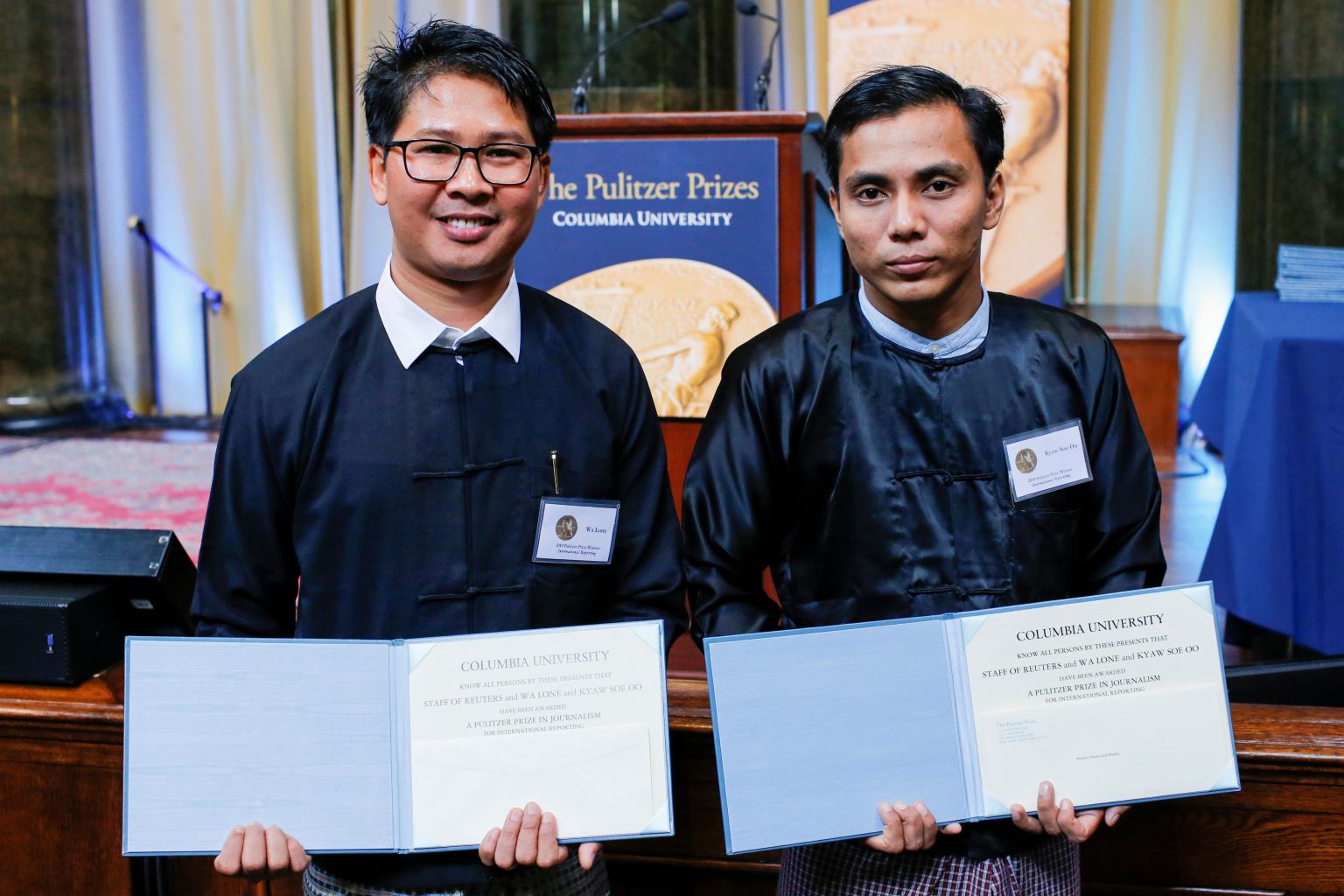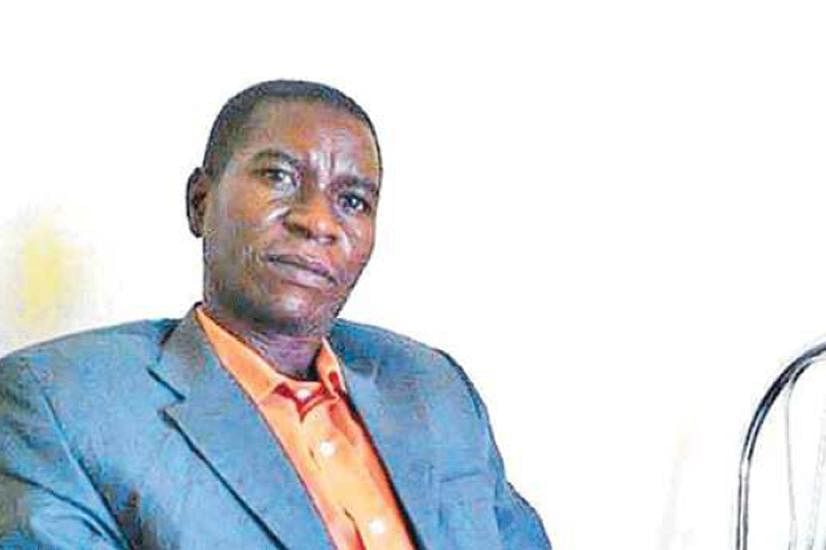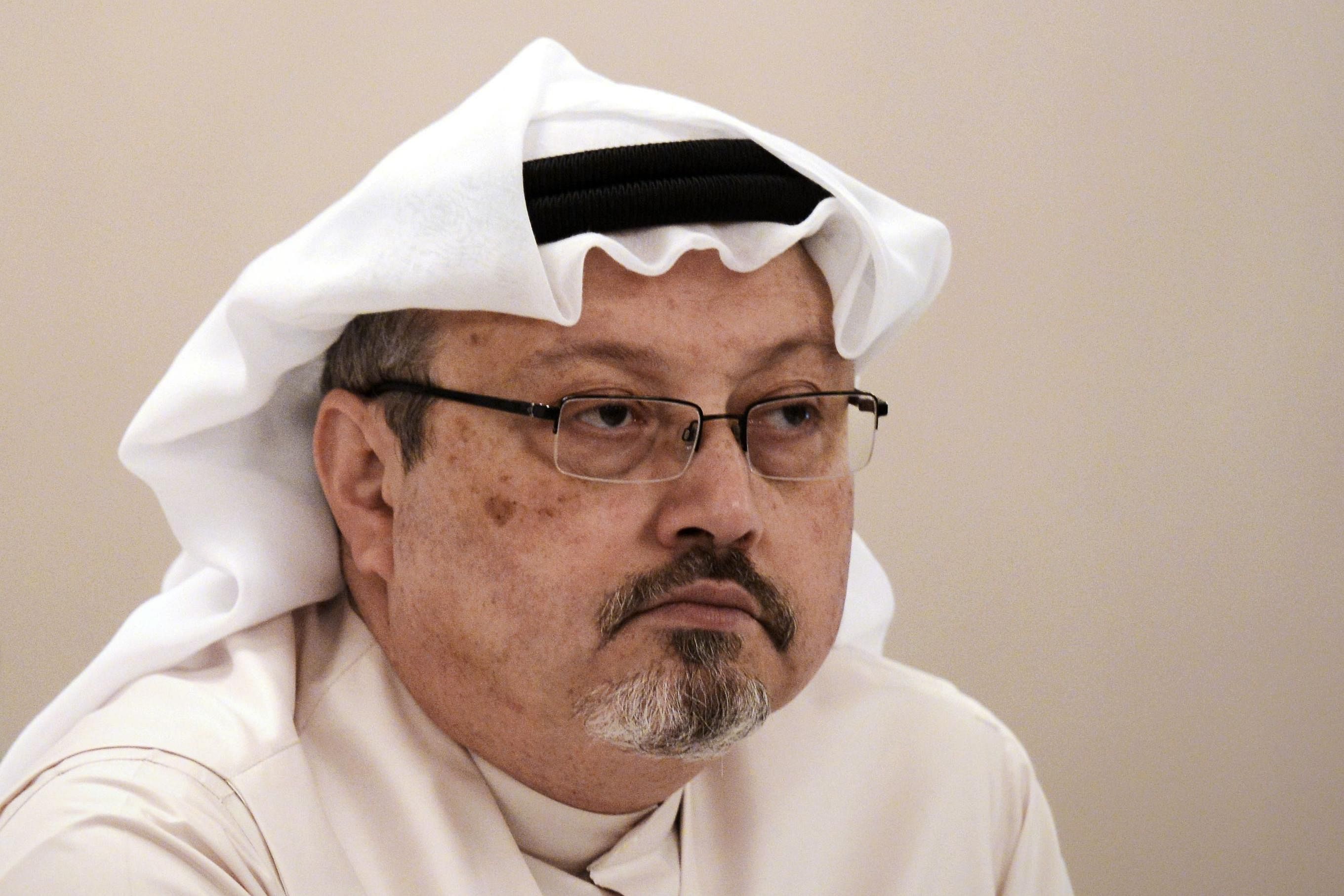'10 Most Urgent' monthly list highlights journalists under threat or attack
Sign up now: Get ST's newsletters delivered to your inbox

Reuters journalists Wa Lone, 33, and Kyaw Soe Oo, 29, after receiving their Pulitzer prizes on May 28, 2019.
PHOTO: REUTERS
Dominique Nelson
Follow topic:
SINGAPORE - After spending more than 500 days in Yangon's Insein prison, Reuters journalists Wa Lone, 33, and Kyaw Soe Oo, 29, were released on May 7.
Their crime? Attempting to see justice served for the killing of 10 Rohingya Muslim men and boys in the village of Inn Din in Myanmar's Rakhine state.
While the two men managed to receive presidential pardons, there are still scores of journalists who are harshly disciplined for trying to report the truth.
To counter the rising threat to media freedom, the One Free Press Coalition was established during a meeting of the International Media Council at the World Economic Forum in March.
It comprises a group of pre-eminent editors and publishers who safeguard journalists under attack for pursuing the truth.
"Protecting the freedoms of the press and the fundamental rights of journalists worldwide is a top priority, and something the Coalition will never stop fighting for," said Mr Randall Lane, chief content officer for Forbes.
"Every day we're inspired to see the outpouring of support for this important global cause, and as we continue to grow, our collective voice will not go unheard," he added.
The Straits Times joined the Coalition in May.
Said Mr Warren Fernandez, editor-in-chief of The Straits Times and Singapore Press Holdings' English, Malay and Tamil Media Group: "In many parts of the world, the safety of journalists, editors and publishers is under serious threat from those who would silence them. The best answer to this is good journalism, letting their stories be told in our media so many others will understand the implications of these developments."
As part of its attempts to spotlight journalists under attack worldwide, the Coalition compiles a monthly list of "10 Most Urgent" cases.
The 10, ranked in order of urgency, are:
Azory Gwanda, Tanzania

The freelance journalist, who was working in rural Tanzania, has been missing since Nov 21, 2017. Before his disappearance, Gwanda had been investigating mysterious killings in his community. The Tanzanian government has so far failed to launch a credible investigation into his case.
Jamal Khashoggi, Saudi Arabia

Months after his brutal murder at the Saudi Arabian consulate in Istanbul, there has been no independent UN criminal investigation. Calls for the White House to release intelligence reports have gone unheeded, along with a deadline to reply to Congress as required under the US Global Magnitsky Act, a law which authorises the US government to sanction human rights offenders.
Aasif Sultan, India
The reporter for a Srinagar-based magazine, Kashmir Narrator, was arrested on "anti-state" charges in August 2018 after he wrote a story on Kashmiri militant leader Burhan Wani. Sultan, who has health issues, has been repeatedly interrogated by police, demanding that he reveal his sources.
Claudia Duque, Colombia

Lack of security and safety in Colombia for journalists has forced some to leave the country; two journalists fled after being harassed online by officials. Others, like local journalist Claudia Duque, have endured kidnapping, illegal surveillance, and psychological torture for decades.
Courts convicted three high-ranking security service officers of torturing Duque and put another eight on trial. As of January 2019, none has served a day in prison.
Miguel Mora and Lucía Pineda, Nicaragua

In December 2018, Nicaraguan police raided a TV station, 100% Noticias, and arrested station director Miguel Mora and Lucía Pineda, its news director. Both journalists have been held for over five months on charges of "inciting hate and violence". While behind bars, both have experienced health issues and been denied access to their lawyers.
Truong Duy Nhat, Vietnam
Truong Duy Nhat, a blogger with the US Congress-funded Radio Free Asia (RFA), went missing in January 2019 in Bangkok, where he had applied for refugee status. The Vietnamese blogger is currently held without charge in a detention centre in Hanoi. Nhat was previously sentenced to two years in prison in 2013 in connection with his critical reporting on the government.
Sevinc Osmanqizi, Azerbaijan
The pro-government Azerbaijani news channel Real TV harassed and attempted to extort Ms Sevinc Osmanqizi in retaliation for her political reporting.
Ms Osmanqizi, who lives in exile in the United States, hosts a TV programme covering Azerbaijani politics on YouTube. Real TV published audio from one of the journalist's private phone conversations and, in a separate segment, an anchor threatened to release intimate photos of her unless she ceased broadcasting.
Abderrahmane Weddady and Cheikh Ould Jiddou, Mauritania
Bloggers Abderrahmane Weddady and Cheikh Ould Jiddou have been behind bars since March after being accused of spreading false news. Both report on corruption in Mauritania. The authorities questioned the bloggers and confiscated their passports and identification cards. Both are being detained in Dar Naim prison.
Seyoum Tsehaye, Eritrea

The journalist is one of several Eritrean journalists arrested after the government summarily banned the privately owned press in 2001, in response to criticism of President Isaias Afwerki. Eritrean authorities have never accounted for the whereabouts, health, or legal status of Seyoum and the others.
Mina Karamitrou, Greece
A makeshift explosive device was detonated under the car of Ms Mina Karamitrou, a police reporter for CNN's Greek edition, in May 2019.
No one was injured in the explosion, which went off outside the journalist's home. Ms Karamitrou believes the attack was related to her coverage of a man who is serving multiple life sentences for murder. As of late May, no arrests had been made.
The Coalition's other members include the Associated Press, Bloomberg News, The Boston Globe, Buzzfeed, Huff Post (formerly The Huffington Post), Insider Inc, Quartz, TIME, Voice of America, The Washington Post, WIRED, and Yahoo News.
European members include CNN Money Switzerland, Corriere Della Sera, De Standaard, Deutsche Welle, EURACTIV, Le Temps, Radio Free Europe/Radio Liberty, Republik, Reuters and Süddeutsche Zeitung.
From Asia, The Financial Times, India Today, Middle East Broadcasting Networks and Radio Free Asia have joined the network together with The Straits Times, while those from the rest of the Americas are AméricaEconomía, Estadão, Office of Cuba Broadcasting and TV Azteca.
Members of the public can join the conversation using the hashtag #OneFreePress and follow developments on Twitter @OneFreePress.
To see the "10 Most Urgent" list every month, readers can visit https://www.onefreepresscoalition.com or @OneFreePress on Twitter.

